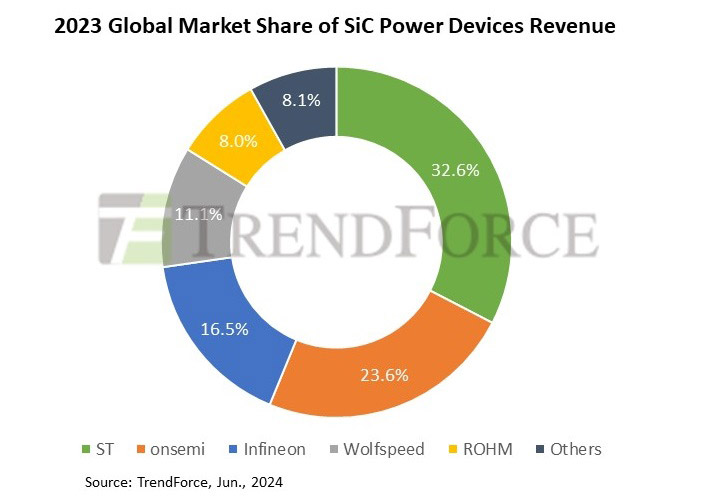News: Markets
20 June 2024
ST remains largest silicon carbide power device maker, with 32.6% market share
Market research firm TrendForce reports that the silicon carbide (SiC) power device industry maintained strong growth in 2023, driven by the application of battery electric vehicles (BEVs). The top five suppliers accounted for about 91.9% of total revenue: Europe-based STMicroelectronics led the pack with 32.6% market share, while US-based onsemi rose from fourth place in 2022 to second place in 2023.
The analysis indicates that demand from artificial intelligence (AI) servers and other fields will rise significantly in 2024. However, the noticeable slowdown in BEVs sales growth and weakening industrial demand are affecting the SiC supply chain. It is expected that the annual growth rate of revenue for SiC power devices will slow significantly in 2024 compared with previous years.

As a key supplier of automotive SiC MOSFETs, ST is building a full-process SiC factory in Catania, Italy, that is expected to be operational by 2026. Additionally, the 8-inch SiC joint venture factory established by ST and Sanan Optoelectronics in China is expected to be up and running by the end of 2024. This will enable ST to achieve vertical integration by combining local post-processing production lines and supporting substrate material factories provided by Sanan Optoelectronics.
onsemi’s SiC business has progressed rapidly in recent years, mainly due to its automotive EliteSiC series of power devices. The firm’s SiC wafer factory in Bucheon, South Korea, completed its expansion in 2023 and plans to transition to 8-inch production after completing relevant technical verification in 2025. Since acquiring SiC materials manufacturer GT Advanced Technologies Inc of Hudson, NH, USA in late 2021, onsemi’s self-sufficiency rate for SiC substrate materials has exceeded 50%. With the increase in internal material production capacity, the company is moving toward achieving a gross profit margin of 50%.
Almost half of Infineon’s SiC revenue is derived from the industrial market, but the main customer of its Kulim, Malaysia plant (SolarEdge) is facing difficulties, which has impacted Infineon’s operations. In contrast, Infineon’s automotive business is developing more robustly, as evidenced by the recent design win with the Xiaomi SU7. Interestingly, Infineon’s previously lagging capacity expansion progress now positions it favorably amid market headwinds. Unlike other leading SiC integrated device manufacturers (IDMs), Infineon lacks internal production capabilities for SiC crystal materials and is actively promoting a diversified supplier system to ensure supply chain stability.
Wolfspeed’s operational strategy missteps have caused it to miss market opportunities over the past two years, leading to setbacks in its power device business. However, Wolfspeed remains the world’s largest supplier of SiC materials — particularly for automotive-grade MOSFET substrates — and has a first-mover advantage in the 8-inch domain.
With Wolfspeed’s John Palmour Manufacturing Center for Silicon Carbide (the JP) about to start production, it is expected to significantly increase material capacity and advance the progress of the Mohawk Valley Fab (MVF) plant’s commissioning. Despite this, Wolfspeed still faces enormous idle capacity and startup costs, which is putting significant pressure on its financial situation. The operational progress of the MVF and JP plants will determine whether Wolfspeed can smoothly navigate this challenging period.
ROHM recently acquired Solar Frontier’s Kunitomi plant as its fourth SiC plant and plans to begin production of 8-inch SiC substrates this year, followed by the manufacturing of power devices. The firm has established long-term partnerships with automotive companies and tier-1 suppliers, such as Vitesco Technologies, Mazda and Geely, accelerating the development of the next generation of power modules to boost its market share.
TrendForce believes that, overall, the SiC industry is in a phase of rapid growth and intense competition, where economies of scale are more critical than any other factor. Leading IDM manufacturers have shifted from their previous conservative and steady strategies to actively investing in SiC expansion plans, aiming to establish a leadership position. Currently, more than 10 companies worldwide are investing in the construction of 8-inch SiC wafer plants. As the market continues to expand, competition in the SiC field is expected to become even more intense.
Silicon carbide power device market to grow to $5.33bn in 2026









